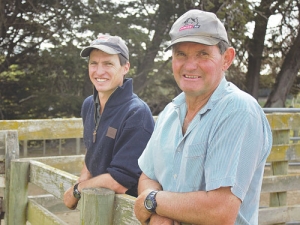A combination of unusual conditions has bothered sheep farmers Hamish and Alastair Craw on their Banks Peninsula farm, Longridge Agriculture Ltd, for 10 years, says Ravensdown.
Since 2004 the Craws have dealt with a range of animal health issues so far unexplained. To start with, their sheep were wasting away with an extreme case of wearing teeth. In 2013, a very rare calcium deficiency was causing their lambs' legs to fracture and in 2015 milk fever issues arose in their ewes.
Alastair Craw says this was at first hitting the business financially, with the more productive animals faring the worst. "We battled for years to get to grips with [the cause of] the wasting and starvation," he says.
The rare conditions have brought together a vet, Richard Bishop; Dr Anne Ridler, Massey University senior lecturer in sheep and beef cattle health and production; Dr Keren Dittmer, Massey University veterinary pathologist; and Julie Wagner, Ravensdown animal health manager and Rangi Holland, agri manager, to try to solve the problem.
"A variety of complex issues needed to be addressed and further investigated," says Wagner. "Because the fractured bone condition is so rare and the teeth wear is a major economic issue in New Zealand, Ravensdown decided to fund research to help the Craw family and see if we could discover something useful for the national issue of teeth wearing."
Richard Bishop, from Vet Life, Little River, says they're using three points of monitoring (blood testing) at pre-weaning, mid lactation and weaning to analyse the results and identify patterns or anomalies.
"We've been monitoring the ewes and lambs in different groups, on improved pasture and native improved pasture. We're reviewing that information and applying it to any conditions to see if it is relevant. The investigation might take several years."
Hamish Craw says the situation has been extremely challenging. "At the start you blame yourself, wondering what you've done wrong. It can knock your confidence."
He says if the teeth wear gets worse it may affect productivity. But he's finding it easier to handle with the industry support behind him.
"Even with all this research we're still not sure what is causing our sheep to have all these problems on this property. But the backing of the scientists and the industry is making it a lot easier for us to cope with. It's good to know at least that it's not a result of anything we're doing wrong," Craw says.
"Finding the solution is important for us and for all NZ sheep farmers who experience teeth wear and other health problems in their stock."











